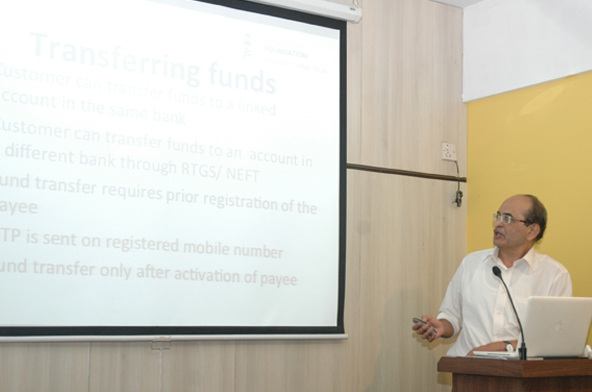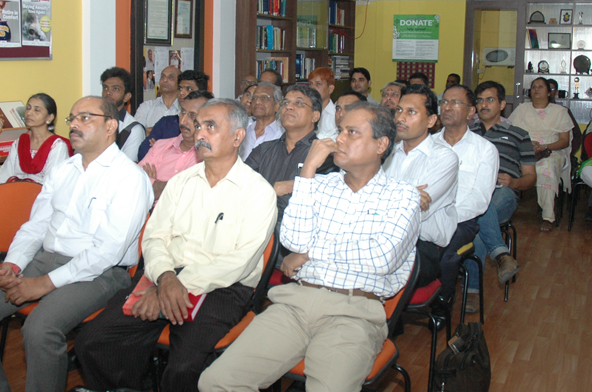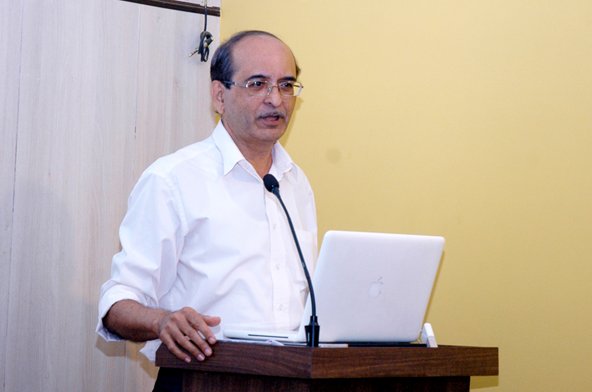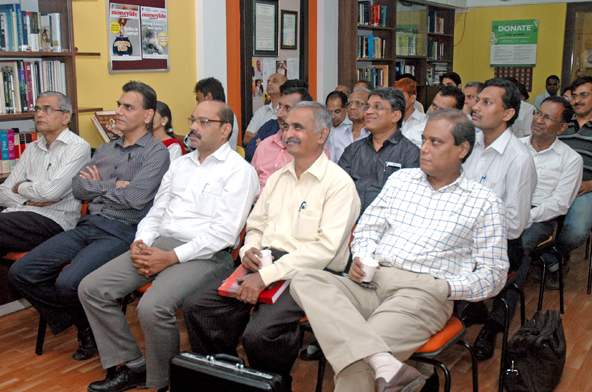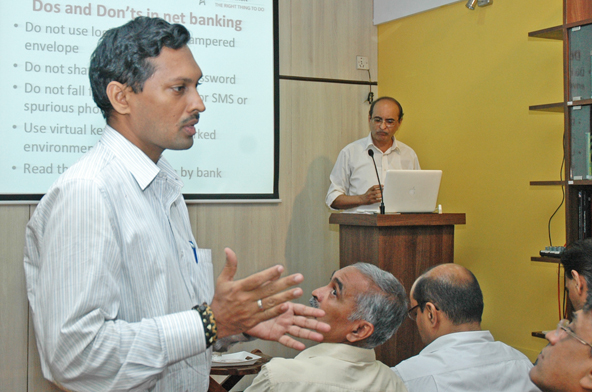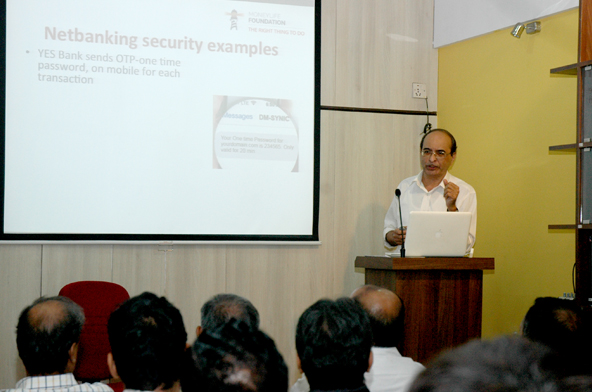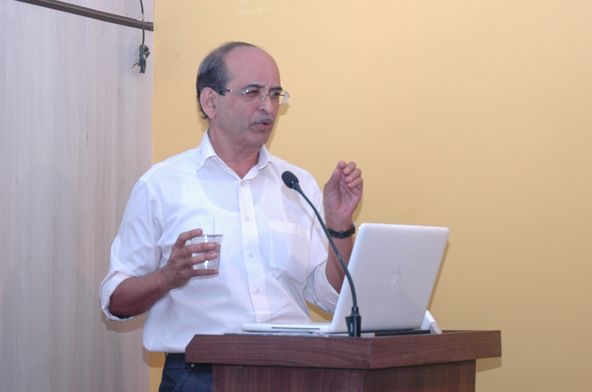
With technological advances in financial transactions like using internet banking facility or electronic clearing system (ECS), life has become much easier, provided you follow some basic rules and precautions, says Abhay Datar, a retired banker and consumer activist. He was speaking at Moneylife Foundation on “Understanding ECS, Direct Debits, Online Banking and ATM and what you should do if you have been defrauded”.
Mr Datar, who retired from Bank of Baroda as IT Manager, says, “There are several benefits of using internet banking and you can certainly explore more once you start using this facility. For example, on 23rd March, using the netbanking facility, I transferred a sizable amount received as quarterly interest into another bank account and also opened an online fixed deposit jointly with my wife. Remember for next four days, all banks were closed. But I was able to complete the transactions comfortably from home without the need to visit bank branches and filling forms and earn more.”
He then explained the process on obtaining login ID, password and transaction password by filling appropriate forms from the bank branch, where the customer has her account. He advised us to opt for receiving SMS alert facility, while filling the application form.
“After receiving the login credentials, you can log into the bank’s website. At first login, the system would prompt you to change the password. Some banks will not allow you to proceed further unless you change the password at this stage. But since it is for your own safety, do change the password at first login, and then, after irregular intervals,” Mr Datar said.
He also explained how to create a good password by using alphanumeric combination and through the usage of wild characters. According to Mr Datar, using virtual keyboard, provided by several banks, for login into netbanking is a better way to keep your credentials secured.
After login into netbanking, one can see information like account number, balance, mini statement (for past 10 transactions) or detailed statement between specified dates and account details.
The customer can also order fresh cheque book online, download and save account statements, open online fixed or recurring deposits (some banks provide this facility), pay utility bills or book tickets, pay income tax and generate challan, apply for shares in IPO (if facilitated by the bank) and transfer funds to another account or linked account.
He then informed the audience about various safety features like one time password (OTP), transaction limits and timeout for completing transactions.
Abhay-Datar-31-3-2016-1
Dos and Don’ts of Internet Banking
If you receive your password or user_id or such other vital information in a tampered envelope, please notify the same to the concerned officer and do not use it.
Do not share your user_id or password or any other vital information with anybody. Even your closest one can misuse the same.
Do not fall for any tempting e-mail or SMS or spurious phone calls.
Always use virtual keyboard when you are working in a networked environment.
Carefully read the instructions given by your banker for using netbanking.
Mr Datar, who is also a managing committee member of Mumbai Grahak Panchayat (MGP), then spoke about using the ECS facility of banks. He said, “The ECS facility monitored by Reserve Bank of India (RBI) is a well-established secure hassle free system for receiving and paying the above amounts. This system establishes a link between your bankers and bankers of your service providers or corporates where you have invested your money, through RBI.”
“There are two types of ECS, one is ECS Credit and another is ECS Debit. The first type, as it denotes, is for receiving various credits to our account, such as dividend and interest; whereas ECS Debit is used for paying telephone, mobile, electricity bills, insurance premium, and SIP of mutual funds. In both the cases, we have to fill up a form and register the same with our bank. Banks generally recover a one-time charge of Rs100 plus tax from customers. The most important part of this form is the nine-digit MICR code and the account number as printed on the cheque book,” he said.
Mr Datar then explained the logic behind the MICR code and bank account numbers. He said, “It is the RBI who allots these numbers to every branch of every bank and they are unique. No bank can interfere in this attribute. As we all know the clearing house of RBI manages handling cheques and ECS in soft format.”
Talking about bank account number structures, he said, “As the MICR code is defined by RBI and is unique, the banks individually define their own branch codes and account number structure.”
Explaining the benefits of using ECS facility, Mr Datar said, “In ECS Debit form, we can define maximum debit limit thereby restricting funds outflow. As far as SIP and insurance premium are concerned, the amount is fixed and does not change every time. This is not the case with mobile, telephone, electricity and other such types of bills and they keep changing every time. We have the apprehension of some exorbitant bill and in such case, we do not want our account to be debited by such a huge amount. We, therefore, can define the maximum debit limit. In such case, whenever RBI sends an ECS beyond this limit, the same gets rejected. For example, if we have put a limit of Rs2,500 to our landline ECS, if the bills is more even by Re1, the same will not be debited to our account. The best way to define this limit while availing ECS is to check our previous bills, find out the bill with maximum amount, keep some upper buffer and set the limit.”
Why ECS?
Safe, hassle-free, well established system
No computer / internet knowledge is required
Reduces use of cheque, thereby saving paper
No long queues
BEST and MTNL offer 1% discount for payment by ECS
No loss or theft or misuse of instruments
Cost-effective
In case of Debit ECS no need to keep a track of due date
Mandate can be changed or withdrawn at any time by the beneficiary
“One more technical problem may arise if we have our account with a non-scheduled co-operative bank,” he said, adding, “such non-scheduled co-operative banks have a separate clearing system and they are dependent upon some other bank having such system. The other bank allots its MICR code to this non-scheduled co-operative bank. If for some reason this co-operative bank changes its bankers, the new bank will allot its MICR code. In such case the earlier MICR code becomes redundant. Even though our other bank details registered earlier for ECS remain unchanged, this change in MICR makes the ECS fail. In such case, we have to notify the changes to our service providers.”
There are some messages doing the rounds on social media about ECS being replaced by national automated clearing house (NACH) offered by the National Payment Corporation of India (NPCI). However, Mr Datar said, on enquiry with a few bank officers and clearing houses, it appears that this would be an internal transformation in banking sector and customers need not do anything.


